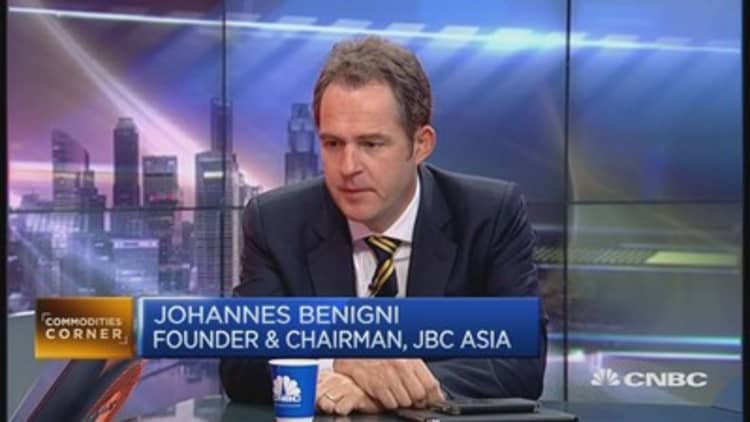
The price of oil bounced Monday morning off two-and-a-half-month lows following the Paris attacks on Friday but analysts told CNBC they weren't expecting any significant movement higher despite rising geopolitical tensions.
Oil prices traditionally spike on fears of supply disruptions caused by military conflict and saw a boost on Monday morning. Front-month U.S. crude futures were trading at $41.63 a barrel at 12:30 p.m. London time, up 88 cents for the session. Brent was trading at $45.03 a barrel, up 57 cents.
Traders and analysts highlighted risks of "uncertainty and geopolitical risks" for the bounce, with the U.S. and France expected to ramp up efforts against the Islamic State in Iraq and al-Sham (ISIS). France launched airstrikes against ISIS Sunday and enters a third day of mourning after deadly attacks in Paris killed 129 people on Friday.
Both crude benchmarks saw high levels of activity in early trading, according to Reuters data. However, Michael Scialla, a research analyst at investment banking firm Stifel, said it was hard to determine how those events can really impact oil prices in the long term.
"I don't see this as a significant supply threat," he told CNBC Monday. He added that, conversely, it could hurt demand for oil as airlines - who use the commodity - could be hit due to less tourism and travel within Europe. Airlines and tourism company stocks were the major underperformers in European markets on Monday, with Air France-KLM shares down 5.6 percent.
Johannes Benigni, founder and chairman of JBC Asia, said it was "far-fetched" to believe that the Paris terror attacks would impact the price of oil.
"You could say (that) the attacks are now triggering a more coordinated response against (ISIS), that eventually removes some of the cheap political risk," he said, adding that it would therefore be bearish for oil.
ISIS is reported to be in control of certain oil fields in the Middle East and have been selling the resource on the international market to fund its campaign. Benigni said that ISIS might be selling up to 20,000 barrels of oil a day, but said that it would be "highly overestimated" to suggest that an increased bombing campaign against the terror group could affect global oil benchmarks.
"In the bigger scheme of things, in the oil market that's not really an issue," he said. "Fundamentally prices are not looking too great right now."
Oil slipped on Friday after Baker Hughes reported the number of oil rigs operating in the U.S. climbed for the first time in 11 weeks. The rig count ticked up by 2 to a total of 574 rigs. This came a day after crude prices tumbled to two-and-a-half month lows after the U.S. government reported a stockpile build four times above market expectations, according to Reuters.





